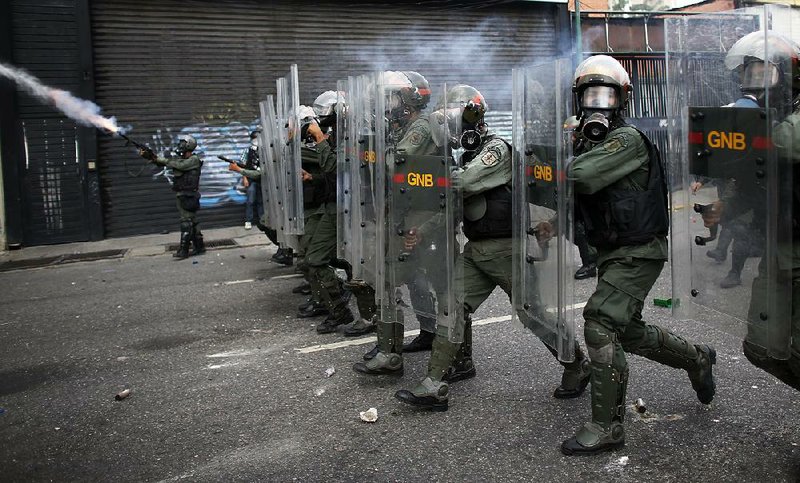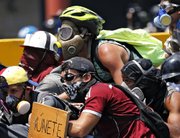CARACAS, Venezuela -- Venezuela's government announced Wednesday that it will go ahead with its threatened withdrawal from the Organization of American States, the regional body whose leader has been a fierce critic of socialist President Nicolas Maduro.
The move came on the same day as fierce confrontations in the capital, Caracas, between security forces and anti-government protesters who staged another march. The political unrest has been blamed for 29 deaths in recent weeks. Clashes also were reported in other Venezuelan cities.
Foreign Minister Delcy Rodriguez called for the withdrawal from the Organization of American States after a brief but contentious meeting at the group's Washington headquarters. The bloc's permanent council voted in favor of holding a special session to evaluate Venezuela's crisis, adding to mounting international pressure for Maduro to schedule delayed elections and free detained political activists.
Rodriguez said the bloc's action was an attempt to "intervene and take custody of our country, something that fortunately will never happen."
Withdrawing from the Organization of American States is a two-year process, but Rodriguez said Venezuela would stop participating immediately. Venezuela is estimated to owe the bloc about $10.5 million in unpaid annual dues. No country has withdrawn from the group since its founding in 1948.
The decision drew quick rebuke from Venezuelan opposition leaders. Former lawmaker Maria Corina Machado said Maduro's exit from the bloc "formalized Venezuela's outlaw status."
Tension has been rising steadily between Venezuela and a group of the bloc's members, including the United States, since Secretary-General Luis Almagro last month issued a 75-page report accusing Maduro's government of systematically violating human rights and standards of democracy. Almagro urged members to suspend Venezuela unless general elections were held soon, but was denied.
Hundreds of thousands of Venezuelans have flooded the streets over the past month to demand an end to Maduro's presidency. The protests have frequently ended in violent confrontations with security forces, which have used tear gas and rubber bullets to disperse crowds.
The unrest shows no sign of dissipating.
Thousands of protesters marched Wednesday on Caracas' main highway to deliver a message to the nation's ombudsman, whose job is to stand up for citizens' rights but whom the opposition has tagged the "defender of the dictator."
State security forces launched tear gas as demonstrators marched on the main highway in Caracas.
"The repression is very strong," said Luis Florido, an opposition lawmaker, as he dodged plumes of tear gas.
Opposition leaders said one protester, Juan Pablo Pernalete Llover, 20, died after being struck by a canister of tear gas.
Ramon Muchacho, a Caracas-area mayor, said at least 22 others were injured in Wednesday's protests, including 14 with severe wounds. Elsewhere, children were evacuated from a school after being exposed to tear gas. In the evening, government officials reported that two national guardsmen were wounded by gunshots in the same part of Caracas where Pernalete Llover was killed earlier.
Venezuela's chief prosecutor, Luisa Ortega Diaz, this week put a spotlight on the extent of the violence, saying more than 400 people had been injured and nearly 1,300 detained since the protests began in response to a Supreme Court ruling last month that stripped the opposition-controlled congress of much of its powers. The decision was later partially reversed after a storm of international criticism.
Opposition leaders have blamed armed pro-government militias known as "colectivos" for a number of the deaths, while government officials have accused the opposition of working with criminal gangs to foment unrest.
Information for this article was contributed by Christine Armario of The Associated Press.
A Section on 04/27/2017

